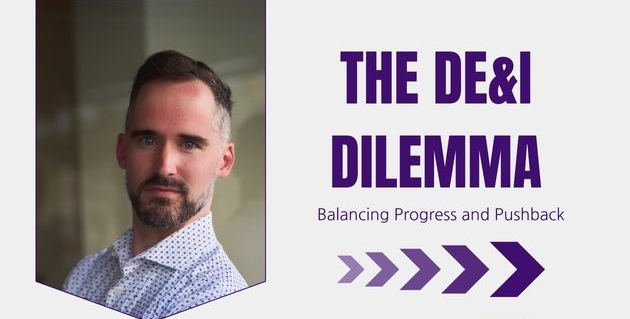The DE&I Dilemma – Balancing Progress and Pushback

With recent rhetoric and trends across industries, it seems like DE&I (Diversity, Equity, and Inclusion) is becoming a four-letter word. Unfounded claims that DE&I efforts are hurting companies and are a drain on resources is resulting in DE&I budgets being slashed, positions eliminated, and people from marginalized communities feeling insecure when it comes to their company having their best interest in mind. Out in Finance believes this is a preposterous trend and there is light at the end of this tunnel – it just may be a longer tunnel than anyone should accept.
Every American remembers the uproar generated by the tragedy of George Floyd. When the country and world saw the countless protests, marches, and peaceful demonstrations. Corporate America took note as well, and when it came time to assemble the following year’s budgets all of a sudden there were initial or increased allocations to DE&I programs. There was a veritable Diversity, Equity, and Inclusion boom as companies came to the realization that their employees believe focusing on DEI is a positive for firm culture and the firm’s bottom-line. There was no more pretending that PR statements and well-curated websites would be enough; firms needed to meaningfully follow through on their corporate values.
To support colleagues, firms began building out DE&I teams, creating Chief Diversity Officer positions, and doling out money to employee resource groups as well as external organizations to try and quickly foster a culture of diversity, equity, and inclusion in their workplaces. Corporations were sold on the business case for DE&I and “while there is ample evidence that DEI can bring benefits such as innovation, creativity, customer satisfaction and employee engagement, these outcomes are often hard to quantify and attribute to specific DEI actions” according to Forbes.
As the first quarter of 2024 comes to a close, the numbers are not positive. Access to DE&I programs and roles are on the decline. Despite there being a growing awareness of the importance behind these efforts, less and less resources are being distributed following increasing pressures from conservative bodies. Bills restricting or banning DE&I in different states are on a sharp incline – some already adopted. Further still, many of these anti-DE&I bills impact the next generation of the workforce, focused on making it illegal for public colleges and universities to use federal funds to support DE&I programming, training, or hiring/admission practices. Hady Mendez, founder & CEO of DE&I consulting group Boldly Speaking, shared that “organizations might use the current environment as an excuse to be compliant […] to otherwise move away from prioritizing DEI initiatives that were never a priority in the first place.” To those who understand that DE&I is an ongoing effort, this indicates that defaulting on these commitments and publicly stated resources allocated towards advancing DE&I was largely performative. For marginalized communities, this can lead to a loss in confidence in firms. This seems to be especially true for firms and institutions lacking a comprehensive DE&I framework or strategy prior to 2020. Despite the positive appearance on the surface, in the press, and with public opinion, the return on investment (ROI) appears to not have yielded sufficient returns fast enough. These factors – largely reactive, unsustainable implementation of DE&I programs; the promise of a financial ROI; and backlash from ‘anti-woke’ individuals – have led to the present cycle where companies are abandoning their DE&I efforts.
The outlook looks bleak, but it does not mean that DE&I is dead. Instead, it means that what is considered DE&I is changing. As with all fields, there are ebbs and flows in growth and size. A national call for change ushered in a wave of opportunities within DE&I, but as companies re-evaluated what is necessary for their organization to uphold these policies, they have recalibrated and swung the pendulum too far in the other direction. While advocates (and detractors) of DE&I wait to see what this decision from companies like Google and Meta will mean for their firm cultures, employee morale, and impact to financial performance. There is also a visible shift from the term DE&I to a rebranding as firm culture or firm values. Rather than having resources dedicated to individual groups or interests, investing “directly into […] people programs rather than as a separate initiative after the fact” is how Zoom Chief Operating Officer Aparna Bawa described their shift to Morningstar. This rebranding can be a positive shift in the ongoing DE&I movement since many companies are committed to maintaining their DE&I initiatives, programs and policies
This shift, while a part of the preposterous trend, will need support if DE&I or value-based cultures will be effective in improving the workplace for marginalized communities. Millennials and Gen-Z rate diversity and inclusivity as one of their top factors when job hunting due to the fact that they are the most diverse generations up to this point. This is only more true when members of those generations belong to marginalized communities, such as the LGBTQ+ community. It is important for companies from all industries to embrace the value of diverse backgrounds and thoughts, create inclusive workplaces that celebrate all employees, and develop equitable opportunities for colleagues.
Employees can support these initiatives by engaging with an employee resource group within their organization (or starting one if one does not already exist); volunteering with organizations working to create more equitable workplaces (such as Out in Finance or Women Investment Professionals); or sharing articles like this with your network. Regardless of the fluctuations in the DE&I landscape, Out in Finance remains committed to working with our corporate and community partners to advance our mission of uniting individuals across the financial services industry to drive LGBTQ+ inclusion and equality.
Authored by
 Eric Krull
Eric Krull
Pronouns: He/Him/His
Director, Chair – Events
